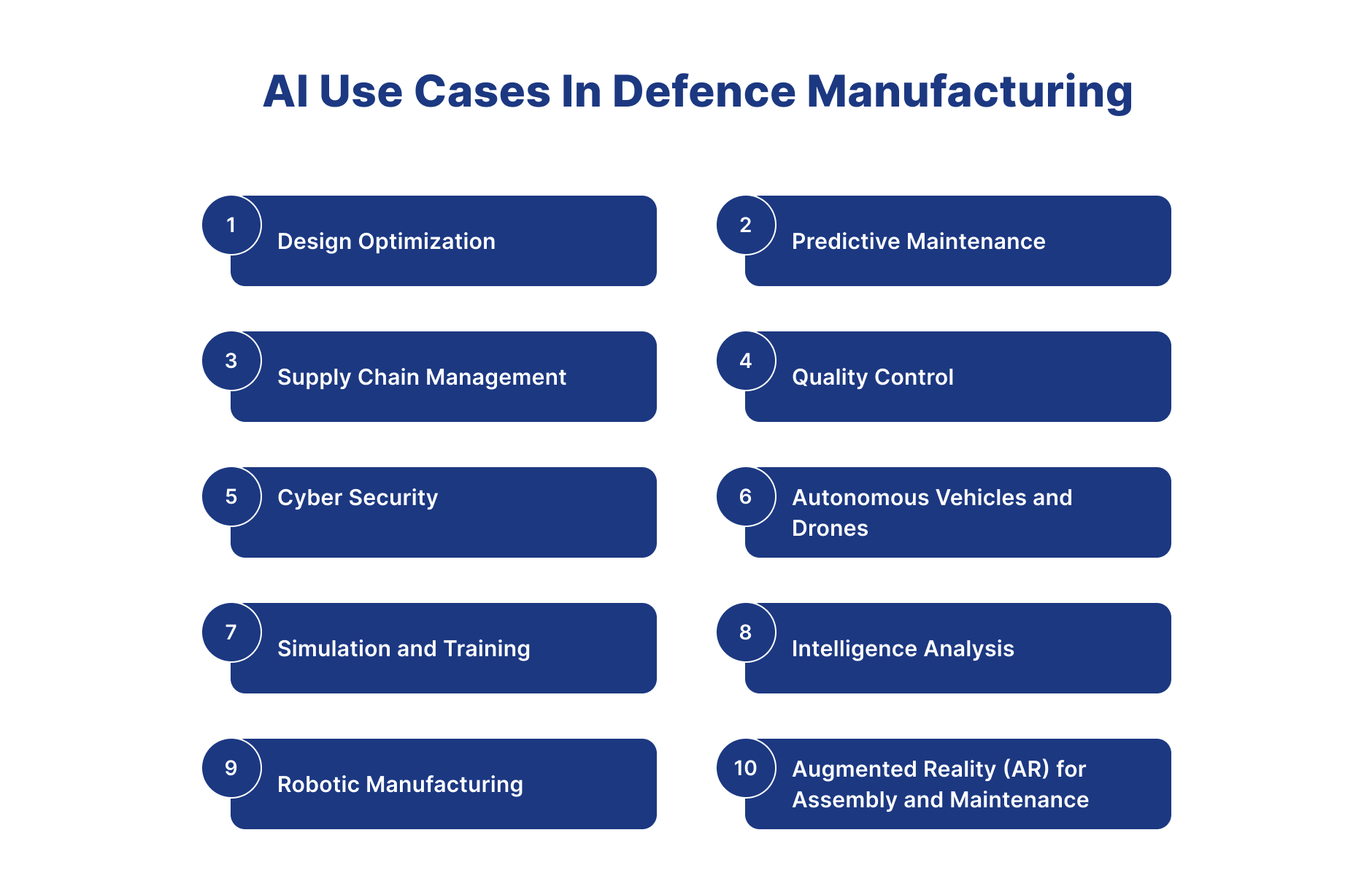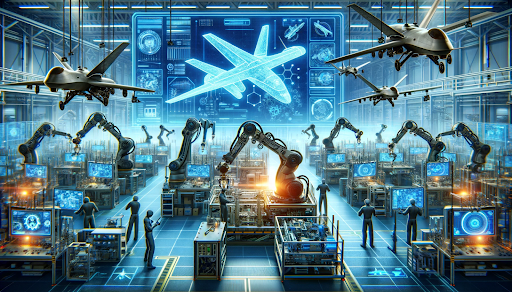AI Use Cases In Defence Manufacturing: 10 Use cases of implementing AI To Improve defense manufacturing
Posted by Hitul Mistry
/20 Jan 24
Tagged under: #ai,#aiinecommerce,#ecommerceindustry
AI use cases in defence manufacturing have altered old procedures and revolutionized how weapons systems are designed, deployed, and maintained in recent years.
Introduction

- AI has evolved as a potent technology with several applications in various industries, including the defense manufacturing business. The AI use cases in defence manufacturing have altered old procedures and revolutionized how weapons systems are designed, deployed, and maintained in recent years. AI technologies have many applications in defense manufacturing, offering greater decision-making capabilities, situational awareness, higher productivity, and cost savings. This essay digs into some of the most famous AI use cases in defence manufacturing businesses, highlighting their potential advantages and national security consequences.
AI Use Cases In Defence Manufacturing

1.Design Optimization:
-
AI is crucial in improving the design phase of defense production. Advanced algorithms can analyze massive volumes of data to optimize military equipment design. This includes improved aerodynamics, material choices, and structural integrity. AI algorithms may also mimic numerous scenarios, assisting engineers in identifying flaws and refining designs before production. This can be an AI Use cases in DefenceManufacturing.
-
Boeing optimizes the design of airplane wings using AI algorithms. AI assists engineers in refining wing designs for optimal fuel economy and structural integrity by analyzing massive datasets relating to aerodynamics, material qualities, and historical performance. This method has helped to produce more sophisticated Extremely efficient planes like the Boeing 787 Dreamliner.
2.Predictive Maintenance:
-
Every defense force must ensure that military equipment is operationally ready. AI-powered predictive maintenance predicts when equipment will likely break, allowing preemptive steps to be implemented. AI algorithms can anticipate the remaining usable life of components, schedule maintenance tasks, and decrease unexpected collecting data from sensors and other sources to reduce downtime. This can be an AI Use cases in Defence Manufacturing.
-
The United States Navy uses AI-powered predictive maintenance to improve the operational readiness of its fleet. AI programs forecast equipment breakdowns by analyzing sensor data from ships and airplanes. This proactive method enables regular maintenance, decreases downtime, and guarantees that naval assets are always ready to deploy.
3.Supply Chain Management:
-
Defense production necessitates intricate and large supply systems. AI can optimize these chains by anticipating demand, optimizing logistics, and ensuring vital components arrive on schedule. Machine learning algorithms may use historical data to find patterns, which can assist defense manufacturers in making educated decisions regarding inventory management and supplier relationships. This can be an AI Use cases in Defence Manufacturing.
-
Lockheed Martin uses artificial intelligence to manage supply chains, anticipate demand, and optimize logistics. The organization analyses historical data using machine learning algorithms to estimate component demand accurately. This guarantees that crucial components are delivered on time while simplifying production and lowering costs.
4.Quality Control:
-
It is vital to maintain the highest quality standards in defense production. Image recognition and machine learning systems driven by AI can inspect items for flaws with unrivaled accuracy. These systems may detect flaws, deviations, or abnormalities in production processes, ensuring that the finished product fulfills strict quality requirements. This can be an AI Use cases in Defence Manufacturing.
-
Raytheon uses AI-powered image recognition systems in manufacturing for quality control. These systems thoroughly inspect components for flaws or anomalies, ensuring products satisfy strict quality requirements. This dedication to quality may be seen in the manufacturing of precision-guided missiles and modern radar systems.
5.Cybersecurity:
-
Cybersecurity is a significant issue as defense systems become more digital. To detect and respond to cyber threats, artificial intelligence is applied in real-time. Machine learning models can analyze network traffic patterns, detect anomalies, and respond to possible security breaches autonomously. This protects the security and integrity of critical defense-related information. This can be an AI Use cases in Defence Manufacturing.
-
AI is used by the Israel Defence Forces (IDF) to detect and respond to cyber threats. AI systems analyze network traffic patterns, detect odd behavior, and respond to possible security breaches autonomously. This proactive cybersecurity strategy has been critical in protecting sensitive military secrets.
6.Autonomous Vehicles and Drones:
- AI is crucial in developing self-driving cars and drones for military use. Machine learning is used in these technologies to navigate complicated surroundings, make real-time judgments, and adapt to changing conditions. Autonomous vehicles may be utilized for surveillance, reconnaissance, and logistics while putting human people in danger. This can be an AI Use cases in Defence Manufacturing.

- The Defence Advanced Research Projects Agency (DARPA) organizes competitions where AI-powered autonomous vehicles handle difficult terrain. These issues drive AI technology research for military applications, supporting the development of autonomous ground vehicles capable of performing duties like reconnaissance and supply transport without human interaction.
7.Simulation and Training:
-
AI-powered simulations give military troops realistic training scenarios. These simulations may recreate complicated warfare settings, allowing soldiers and commanders to practice decision-making and tactical techniques in a safe environment. This improves training efficacy and lowers the requirement for live exercises, saving money and decreasing dangers. This can be an AI Use cases in Defence Manufacturing.
-
Virtual Battlespace (VBS) from Bohemia Interactive Simulations is an AI-powered simulation platform used for military training. VBS simulates realistic warfare conditions, allowing soldiers and commanders to practice virtually. This immersive training improves situational awareness and decision-making in challenging settings.
8.Intelligence Analysis:
-
AI algorithms play an important role in processing and analyzing massive volumes of data to extract relevant insight. NLP and machine learning can filter through unstructured data sources like social media to detect possible hazards and deliver timely insights to decision-makers. This can be an AI Use cases in Defence Manufacturing.
-
Palantir Technologies offers an AI-powered intelligence analysis platform. Their program uses machine learning and natural language processing to filter through massive volumes of unstructured data, assisting intelligence agencies in identifying patterns, relationships, and possible threats. Defense and intelligence organizations throughout the world rely heavily on the platform.
9.Robotic Manufacturing:
-
AI-powered robotics are revolutionizing the industrial process by automating jobs ranging from component assembly to welding and painting. AI-enabled robots can improve production efficiency with more precision, speed, and consistency. This shortens the production timeframe and decreases the possibility of mistakes that might jeopardize military equipment operations. This can be an AI Use cases in Defence Manufacturing.
-
BAE equipment assembles complicated defense equipment using robotic production with AI capabilities. These robots do operations like welding and assembling with precision and speed. This strategy enhances production efficiency and maintains consistent quality in military equipment manufacturing.
10.Augmented Reality (AR) for Assembly and Maintenance:
-
AI-powered augmented reality apps are used in defense production for assembly and maintenance duties. Workers can use AR devices to superimpose digital information on physical components, offering step-by-step instructions during assembly or maintenance processes. This improves accuracy, shortens the learning curve for complicated jobs, and allows remote support, especially useful in circumstances requiring specialized knowledge. This can be an AI Use cases in Defence Manufacturing.
-
Airbus employs augmented reality in its aircraft construction and maintenance operations. AR devices allow technicians to access digital overlays of assembly instructions and maintenance processes, which improves accuracy and efficiency. This technology guarantees that difficult jobs are completed correctly, contributing to military aircraft's general dependability.
Conclusion
- In conclusion, the integration of AI technology has tremendously influenced the aviation sector. The AI use cases in defence manufacturing have transformed several elements of the business, including aircraft maintenance, flight operations, safety management, and passenger experience. AI use cases in defence manufacturing have helped airlines optimize maintenance schedules, minimize aircraft downtime, and improve overall safety using enhanced predictive maintenance algorithms. AI-powered flight operations systems have improved flight planning, route optimization, and fuel economy, saving airlines substantial money. Furthermore, AI-powered customer care solutions have improved the passenger experience by providing personalized suggestions and practical customer assistance. As AI advances, the aviation sector will profit from new automation, autonomous flying, and air traffic control developments.
How Digiqt will help you to adapt AI in your company
-
At Digiqt, we are dedicated to assisting companies in automating critical processes. Our highly skilled and professional team ensures the timely development and delivery of AI software. We commence by thoroughly understanding our client's specific requirements, and based on these requirements, our proficient team develops the AI software. Furthermore, we provide our clients monthly updates on the software development progress.
-
Digiqt's commitment to automation, client-centric software development, and regular updates ensures efficiency and effectiveness in streamlining insurance operations.
Contact Us
About Us
We are a trusted, quality driven and value-driven digital product development company delivering services in BFSI sector.
Digiqt Technolabs is a passion turned into a company. We are a trusted product development company that specializes in turning your ideas into digital solutions utilizing our years of experience in industry-leading technologies.
We deliver high-tech innovations and great solutions for our clients in the most efficient manner regardless of the project complexity.
We are trusted, quality-driven and value-driven product development company.

Our key clients
Companies we are associated with
Our Offices

Ahmedabad
706,31FIVE Building,opp.Palladium, Corporate Rd, Makarba, Ahmedabad, Gujarat.
+91 99747 29554

Mumbai
WeWork, Enam Sambhav C-20, G Block,Bandra- Kurla Complex, MUMBAI-400051, Maharashtra.
+91 99747 29554

Stockholm
Bäverbäcksgränd 10 12462 Bandhagen, Stockholm, Sweden.
+46 72789 9039












